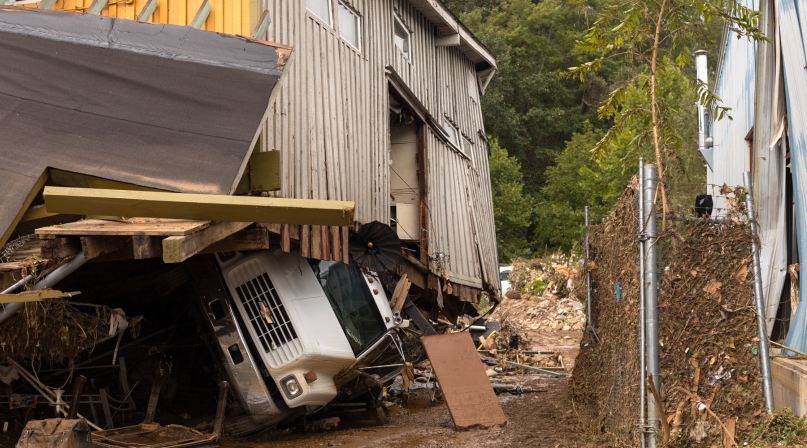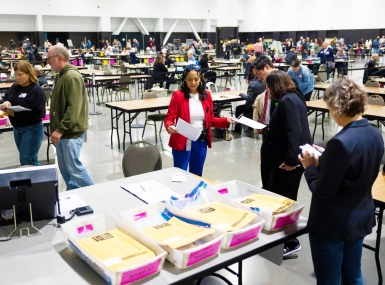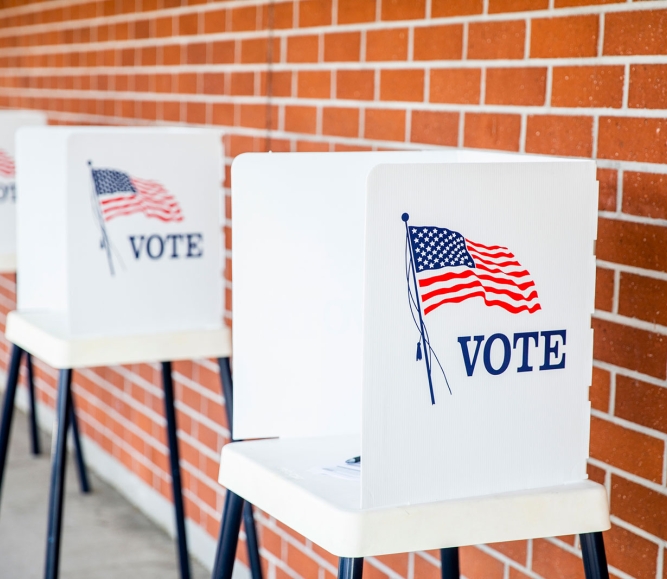County election staff roll up their sleeves after hurricanes hit

Key Takeaways
On Sept. 26, Category 4 Hurricane Helene devastated counties across nearly 500 miles of the southeast, killing more than 230 people and causing billions of dollars’ worth of damage. The day after the storm, Corinne Duncan, Buncombe County, N.C.’s election services director, headed to the elections office, passing through non-functioning stoplights and maneuvering around several fallen trees on her way, to continue preparing for the 2024 presidential election.
The office had no water or cell service, but the power did not go out (more than 36,000 customers still don’t have power in the county, as of Oct. 10, according to Duke Energy), so Duncan got to work, messaging elections staff and poll workers — making sure that they were safe, had a place to stay and that they would be prepared to work when early voting opened in 20 days.
Learn more
Counties respond to hurricanes ahead of November 2024 elections
The county’s election workers hadn’t been trained, some poll workers were forced to evacuate, six polling sites had been flooded and roughly 8,000 ballots were sent out in the days before the storm hit, meaning they would potentially never reach the voters who had requested them. There was a lot to do in 20 days.
“We are definitely facing challenges and we’re on a really tight timeline,” Duncan said, a week before early voting started in the county. “… Sometimes, a saying turns into something different when you experience something, and for me, that has been ‘Take it one day at a time.’”
Back-to-back hurricanes
Two weeks after Hurricane Helene, Category 3 Hurricane Milton hit Florida. It was the second-most intense Atlantic hurricane over the Gulf of Mexico, on record. Manatee, Pinellas, Pasco and Sarasota counties experienced extensive damage from both Helene and Milton, and the latter unleashed destruction in a number of central and eastern Florida counties.
The damage to infrastructure from the storms, and the subsequent tornadoes, prompted Florida election supervisors to call on Florida Gov. Ron DeSantis to make changes to voting procedures for the General Election. On Oct. 16, DeSantis signed an executive order that allows for more flexibility in the elections process for counties affected by Milton, which include voting accommodations for first responders, linemen and relief workers who are assisting with recovery efforts throughout the state and allowing voters to request a mail-in ballot to an alternative address from the one they’re registered at (in the event of displacement).
Thirteen Florida counties affected by Hurricane Helene were granted leeway in the elections process, as well, through an executive order DeSantis signed Oct. 3.
Hurricane Milton left some polling places in Hillsborough County, Fla. with five feet of flooding, damaging five election day sites (which will be moved and co-located to other nearby polling sites), according to Hillsborough County’s Supervisor of Elections Craig Latimer.
“This is unprecedented that we had two back-to-back hurricanes, two weeks apart or so,” Latimer said. “And they were two totally different storms. Hurricane Helene was a tremendous flooding event, storm surge, and then Hurricane Milton was a wind and rain event.”
The county elections office regained power Oct. 7 and reopened the next day, a week before early voting opens, and one early voting site is on a generator, according to Latimer. “I think we’re in a good position right now. But this happened over night, and this takes planning. We’re constantly planning for things like this, and making sure that we have contingencies in place.”
Staff bands together
The unprecedented nature of Helene’s destruction in North Carolina has banded the county’s Board of Elections Office staff together, Duncan said.
A few of the people who have wells have been bringing in water for those without water and a food-sharing area has been created at the office, to ensure that everyone has essentials.
“We talked to each other and hugged each other and had our tears and all of those kinds of things, which continue,” Duncan said.
“It’s going to be like that for a while, but Elections has always been, we refer to it as family all the time, and that’s really what happened, and I think that really enabled us to turn around really quick and start working.
“We were sending out absentee ballots already [four days after the storm hit], coming together to make a plan and moving forward, and we’ve just done that every day since then.”
On Oct. 7, the North Carolina State Board of Elections unanimously approved a series of emergency measures in the 13 counties, including Buncombe, that were hit the hardest by Helene.
Measures approved include allowing voters to request and receive absentee ballots at their county board of elections office up until Nov. 4, allowing county boards to schedule Multipartisan Assistance Teams to assist with absentee voting and ballot requests at disaster shelters and allowing poll workers to serve at voting sites outside of their county.
All 100 county boards of elections in North Carolina are open to the public, and while early voting may look different than expected in some of the 13 hardest hit counties, it will go on, said Karen Brinson Bell, the executive director of the North Carolina state board of elections, in an Oct. 7 press conference.
“Put simply, these measures will help eligible voters in the affected areas cast their ballot, either in-person or by mail,” Brinson Bell said. “And they will help county boards of elections in western North Carolina administer this election under extraordinarily difficult conditions.”
Another measure approved in the resolution allows counties to modify their approved early voting sites, as well as days and hours through a bipartisan, majority vote.
Buncombe County added an extra day of early voting and expanded its hours, according to Duncan. Roughly two-thirds of the election workers slated to work early voting are still able to, enough to staff the county’s 10 early voting sites, Duncan said. For election day, 501 out of the original 537 election workers have confirmed they will still be available.
In Haywood County, N.C., many people who were not set to work this election, but have worked past elections, have stepped up to fill in the gaps, according to Doyle Teague, the county election board’s deputy director. With the extra help, the county is “ready to go” for early voting, Teague said.
Voting may be more difficult in certain parts of the county, particularly in one community that sits on the Tennessee border, where the post office was destroyed in Helene, Teague said.
“There’re only 25 voters in that little isolated community, but their main access road, it was right beside the Pigeon River and washed away, and the post office was in there from the Tennessee side,” Teague said.
“There’s another access road that’s all back roads and park service roads to get to them, but they’re at least getting mail once a week, and we’re going to be able to open that precinct on election day, so that they won’t have to rely on the mail service.”
With only three weeks between the deadliest inland hurricane on record and the opening of early voting for the 2024 presidential election, Western North Carolina’s counties and elections offices have been able to come together, with support from the State Board of Elections and the Army National Guard, to ensure that voting remains accessible, safe and secure, Duncan said.
“So many counties have reached out to support us,” Duncan said. “Offering supplies, offering help, to come to the office … and seeing my team support each other and be able to come together again with our mission of providing people their right to vote has been magical.”
Related News

Multi-State Information Sharing and Analysis Center (MS-ISAC) loses federal funding
On March 11, the Cybersecurity and Infrastructure Security Agency (CISA) announced a $10 million cut in funding for the Multi-State Information Sharing and Analysis Center (MS-ISAC), which provides critical local assistance for cybersecurity threat detection and analysis resources and support.
Election administrators anticipate continued challenges
The 2024 election was success in the eyes of elections administrators, but several panelists see areas of concern brewing for future years.

Counties overcome challenges on Election Day
In the aftermath of Election Day, county election offices across the country are taking note of the challenges they faced, including bomb threats, technical issues and ballot printing problems that led to extending voting hours and recounting ballots or duplicating them to be properly scanned.
Advocacy
Counties respond to hurricanes ahead of November 2024 elections
Natural disasters can put major strain on election administrators and polling places as they reckon with infrastructure and logistic issues.

